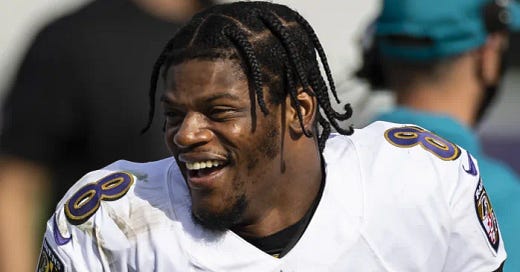Hire An Agent?
The biggest news from last week’s NFL Draft was really not about the Draft at all, but the fact that Lamar Jackson finally signed a contract extension with the Baltimore Ravens. The standoff between the former MVP and his team dragged out for practically a year, with Jackson eventually requesting a trade; for a minute there it looked like he would actually sit out next season if he didn’t get that trade. But in the end he signed a $260 million contract, with $185 million guaranteed.
While the two sides were at an impasse though, it raised all sorts of questions. About collusion between NFL owners, about the future of guaranteed contracts in the NFL, and about the use of the franchise tag. And one question that kept popping up was: Shouldn’t Jackson hire an agent?
Ever since he first entered the Draft in 2018, Lamar Jackson has gone without an agent, and faced questions about that decision. The lack of an agent was blamed for his slide to the end of the first round in 2018, for the inability to get an extension worked out before last season, and for the near-failure to get it done this off-season. It seemed like a massive self-inflicted wound by Jackson. At times the Ravens front office suggested that they were struggling to get a deal done simply because they didn’t know who to call about it.
Of course, now that the deal is done, it seems like much ado about nothing. In fact, there’s now a bunch of people suggesting that Jackson not hiring an agent was a stroke of genius, since he saves the ~3% fee that an NFL agent charges. And, you know, 3% of $260 million is a lot of money… Instead, that money is going to Jackson’s mom, who advised him through the process, which is nice.
But I must say that I find a lot of this anti-agent sentiment a little unnerving. Agents are important advocates for players, and a crucial part of the adversarial negotiation process between workers and ownership. It may have worked out for Jackson, but if more players decide to forgo agents, particularly players who are less prominent than Jackson, it will surely lead to more exploitation of players by their teams.
At the same time, I get why players resent agents. Some jerk coming in and getting 3-6% of MY money? That seems like quite a price to pay for something that should, theoretically, be simple.
Most workers won’t find themselves in Lamar Jackson’s exact situation, of course, but this kind of resentment between workers and the professional class is actually pretty common. People confront professionals in moments of capitalist alienation. Things that should be simple – negotiating your salary, signing a contract, paying your taxes, getting health care – actually involve navigating a bewildering process that requires highly specialized knowledge. Just to go through the basic steps of modern life, you have to hire a lawyer or an accountant or an agent – who then charges a hefty cut.
And it’s not just that it costs money. Most people recognize that, when these professionals do their job well, they are worth the money. But because these jobs require such specific training and expertise, it is often impossible to know if they ARE doing their job well. You have to put a great deal of trust in them, and it’s easy to feel like you’re being taken advantage of, even if you can’t quite see how or explain why.
It’s worth saying, as an aside, that it’s no coincidence that so many of these jobs — lawyer, agent, accountant — are seen as “Jewish jobs.” As I wrote last year, in a piece on antisemitism, it has long been observed that people confront the misfortunes of capitalism in the form of Jews, who for various historical reasons have found success in professions that often involve working your way through systems that are fundamentally exploitative and unfair.
Lamar Jackson is going to be very well-compensated, don’t get me wrong; but he is fundamentally a worker whose labor is being appropriated by a class of owners who profit from his work, so his contract negotiation is a process that benefits the ownership class. Even though an agent would be on his side in such a negotiation, it’s easy to see why he might see the agent as a symbol of a broken system. It’s the same way that you might be angry with the accountant who tells you that you owe more in taxes than you think is fair, or the judge who rules against you on a technicality.
Professionals represent systems that have been set up to benefit capitalists. As such, they tend to identify with the interests of the ownership class — that is, on some level, their whole job, as I’ve written before.
But resenting them for this is, I think, counterproductive. Anti-PMC animus is obviously not as hateful or dangerous as antisemitism, but I think it has a similarly counterproductive effect of focusing anger on the wrong places. It makes total sense for Jackson to feel alienated by the negotiation process, but he should be angry with the owners, not with a hypothetical agent taking 3%. Indeed, many celebrations of his contract talk about how he “beat the NFL machine” by scoring such a big contract without an agent. And I guess you could call agents part of “the NFL machine,” but they’re not exactly its engine. More like a hubcap.
Ultimately, a world where fewer players hire agents would be great for owners and terrible for players. Getting rid of agents because the process of setting NFL salaries is screwed up would be like getting rid of defense attorneys because the criminal justice system is screwed up. It is important to be clear-headed about where the problem lies, and usually the answer to that lies in who owns the means of production.



